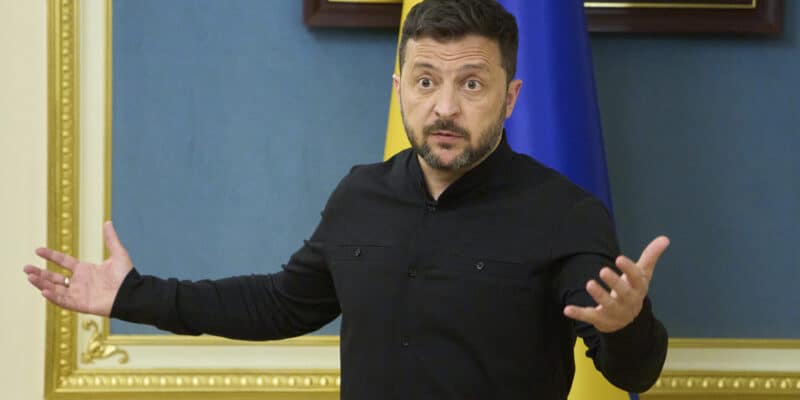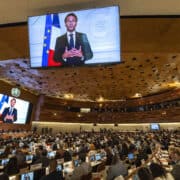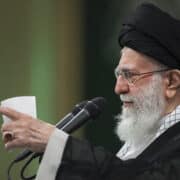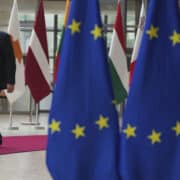(AP) — U.S. President Donald Trump’s phone calls with the leaders of Russia and Ukraine deepened expectations that progress might soon be made on ending those countries’ more than three-year war, though frustration at the slow pace of negotiations and the absence of any significant breakthrough kept hopes low.
“It is obvious that Russia is trying to buy time to continue the war and occupation,” Ukrainian President Volodymyr Zelenskyy said Tuesday on Telegram. “We are working with partners to put pressure on the Russians to behave differently,” he added in an apparent reference to further international sanctions on Russia.
Ukraine has offered a comprehensive 30-day ceasefire, which Moscow has effectively rejected by imposing far-reaching conditions, and Zelenskyy proposed a face-to-face meeting with Russian President Vladimir Putin but the Russian leader spurned that offer.
Trump said his personal intervention was needed to push peace efforts forward, and on Monday he held separate talks over the phone with Zelenskyy and Putin.
Russia and Ukraine will “immediately” begin ceasefire negotiations, Trump announced, though there was no detail on exactly when or where such talks might take place and who might attend them.
“The status quo has not changed,” Mykhailo Podoliak, a senior adviser to Zelenskyy, wrote on the social platform X on Tuesday.
Putin wants Ukraine to renounce joining NATO, sharply cut its army, and withdraw its forces from the four Ukrainian regions Moscow has seized but doesn’t fully control, among other demands.
In Russia, many news outlets struck a note of triumph when reporting Putin’s conversation with Trump.
State news agency RIA Novosti published an article headlined, “Europe’s hopes crushed: Trump refuses to go to war with Putin.”
In the pro-Kremlin tabloid Moskovsky Komsomolets, columnist Mikhail Rostovsky also portrayed the call as a blow for Ukraine’s European allies.
“Kyiv will agree to a serious, fully fledged conversation with Russia only if it has no other options left. Trump is gradually cutting off these other options for Zelenskyy,” he wrote. “And this is very, very good.”
U.S. officials have for the past few months urged Russia and Ukraine to reach a settlement, as Trump sought a swift end to Europe’s biggest conflict since World War II.
Trump said his talks with Putin on Monday were “excellent,” but European officials were skeptical about Russia’s intentions.
“Putin has never changed his position,” Estonian Defense Minister Hanno Pevkur said in Brussels on Tuesday. “Russia actually doesn’t want to end this war.”
The European Union’s foreign policy chief, Kaja Kallas, said Russia’s failure to negotiate in good faith should trigger threatened U.S. sanctions.
“We really haven’t seen, you know, the pressure on Russia from these talks,” she told reporters.
On the streets of Kyiv on Tuesday, skepticism about Putin’s motives was high.
Peace “is not possible now. Only when (the Russians) run out of resources and army manpower. They are ready to fight, at least for this summer,” 66-year-old Svitlana Kyryliuk told The Associated Press. Putin will “stall for time, and that’s it,” she said.
Volodymyr Lysytsia, a 45-year-old serviceman visiting the capital for rehabilitation, said Putin has made the front lines in eastern Ukraine a wasteland.
The Russian leader “leaves nothing there, only scorched earth, everything bombed,” Lysytsia said.
Some were unconvinced by Putin’s promise to Trump that Russia is “ready to work with” Ukraine on a “memorandum” outlining the framework for “a possible future peace treaty.”
“It appears that Putin has devised a way to offer Trump an interim, tangible outcome from Washington’s peace efforts without making any real concessions,” Tatiana Stanovaya, a senior fellow at the Carnegie Russia Eurasia Center, said on X.
The warring countries are insisting on apparently irreconcilable conditions for peace, and even a temporary truce has been out of reach.
The first direct Russia-Ukraine peace talks since the early weeks of Moscow’s 2022 invasion ended after less than two hours last Friday, and while both sides agreed on a large prisoner swap, they clearly remained far apart on key conditions for ending the fighting.
___
Lorne Cook in Brussels and Katie Marie Davies in Manchester, England contributed.
___






